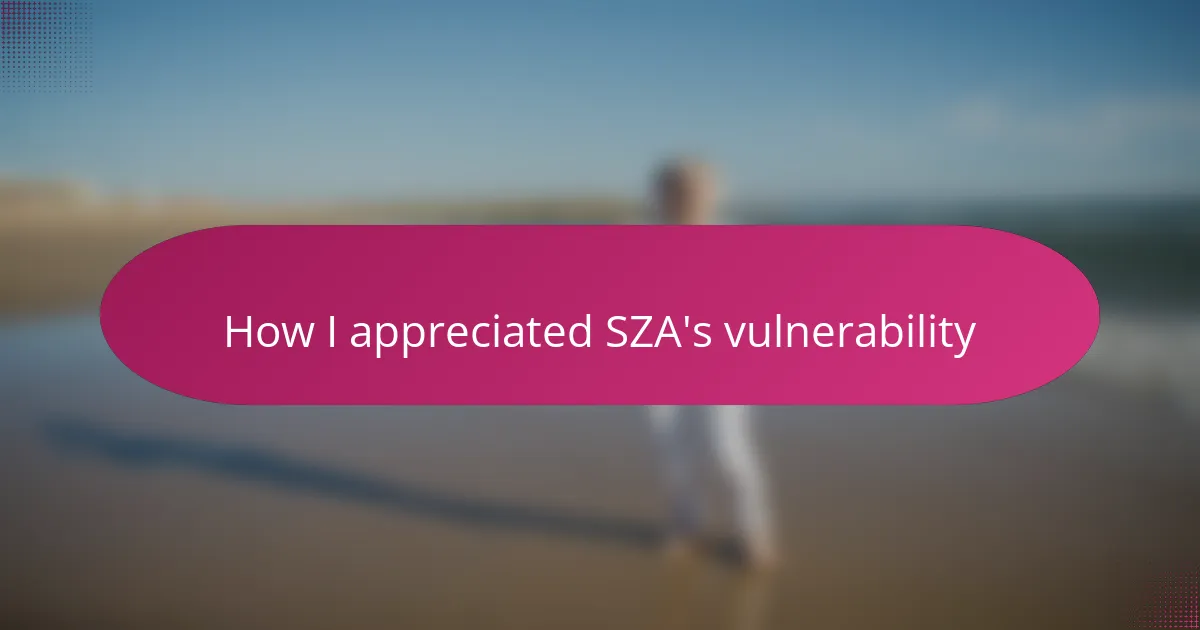Key takeaways
- Vulnerability in rap music showcases artists’ true emotions, challenging the genre’s tough exterior and fostering deeper connections with listeners.
- SZA’s honest exploration of themes like insecurity and self-discovery redefines vulnerability as a source of strength, resonating with fans and promoting authenticity.
- Emotional honesty in music transforms it into a shared experience, encouraging listeners to reflect on their own struggles and feel less alone.
- SZA’s impact encourages rap fans to embrace their imperfections and fosters a supportive community that celebrates emotional openness.
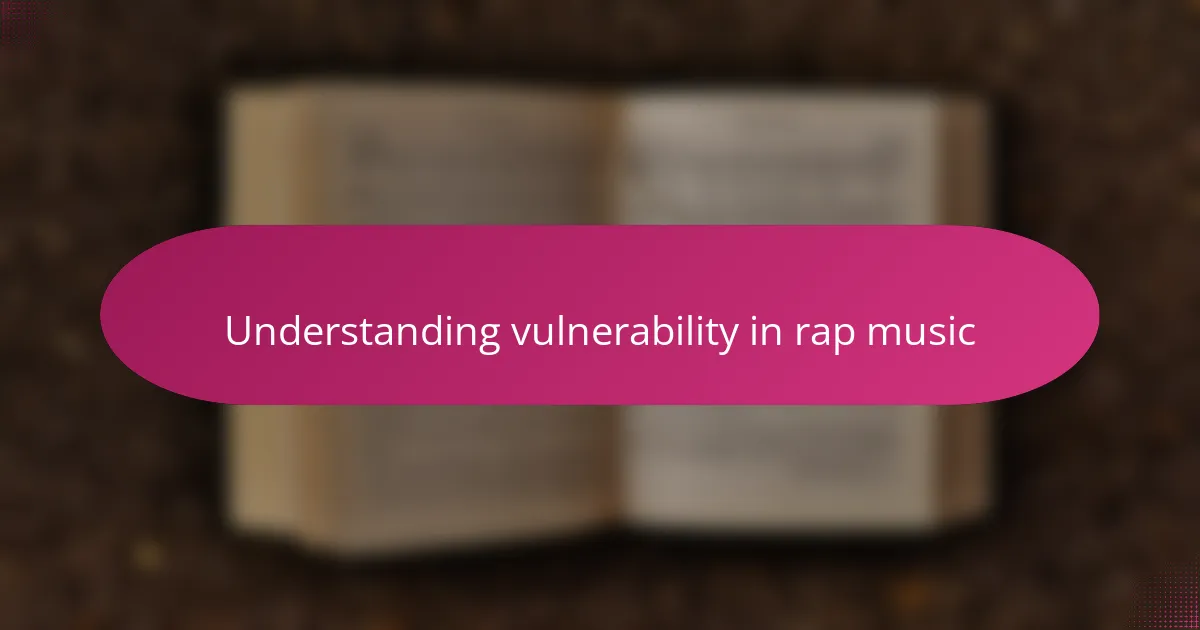
Understanding vulnerability in rap music
Vulnerability in rap music often reveals a side of artists that isn’t just about bravado or competition but about raw, real human emotion. When I first heard rappers break down their fears and struggles, it hit me in a way nothing else did—it was like they were inviting me into their world, flaws and all. Have you ever noticed how those moments of honesty in songs make the artist feel more relatable, almost like a friend sharing their story?
Sometimes, vulnerability challenges the traditional image of rap as just tough and unbreakable. It takes courage to expose pain or doubt while knowing the world often expects toughness. I think this tension is what makes vulnerable tracks so compelling; they remind us that strength isn’t just about being unshakable but also about showing your true feelings despite the risk.
In my experience, vulnerability in rap music pushes the genre’s boundaries and deepens its impact. It transforms music from just entertainment into something healing and connective. Isn’t it fascinating how hearing someone speak candidly about their struggles can open the door for all of us to reflect on our own?
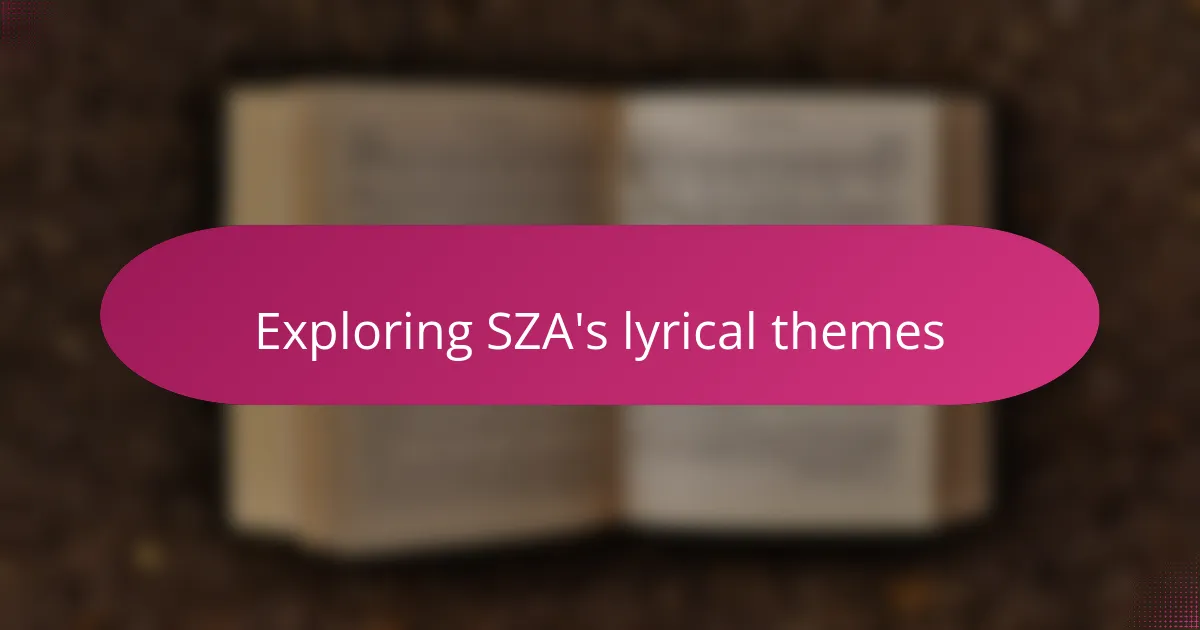
Exploring SZA’s lyrical themes
SZA’s lyrics often dive into themes of insecurity, love, and self-discovery in a way that feels incredibly honest. When I first listened to her music, I was struck by how she didn’t shy away from showing her imperfections—she made vulnerability sound not like a weakness but a source of strength. Have you ever felt like an artist was simply putting your own thoughts into words? That’s exactly how SZA’s songwriting connected with me.
I find it refreshing how she navigates complex emotions without wrapping them in bravado or clichés. Her storytelling feels intimate, like a late-night conversation where you both admit your fears and hopes. It got me thinking about how rare it is in rap to hear such raw emotional honesty, and why that resonates so deeply with listeners craving authenticity.
What really stands out, to me, is how SZA balances heartbreak and empowerment seamlessly. She doesn’t just dwell on pain; she explores growth and acceptance too. This holistic approach to emotions invited me to reflect on my own experiences with vulnerability, making her music a kind of emotional mirror that’s both comforting and challenging.
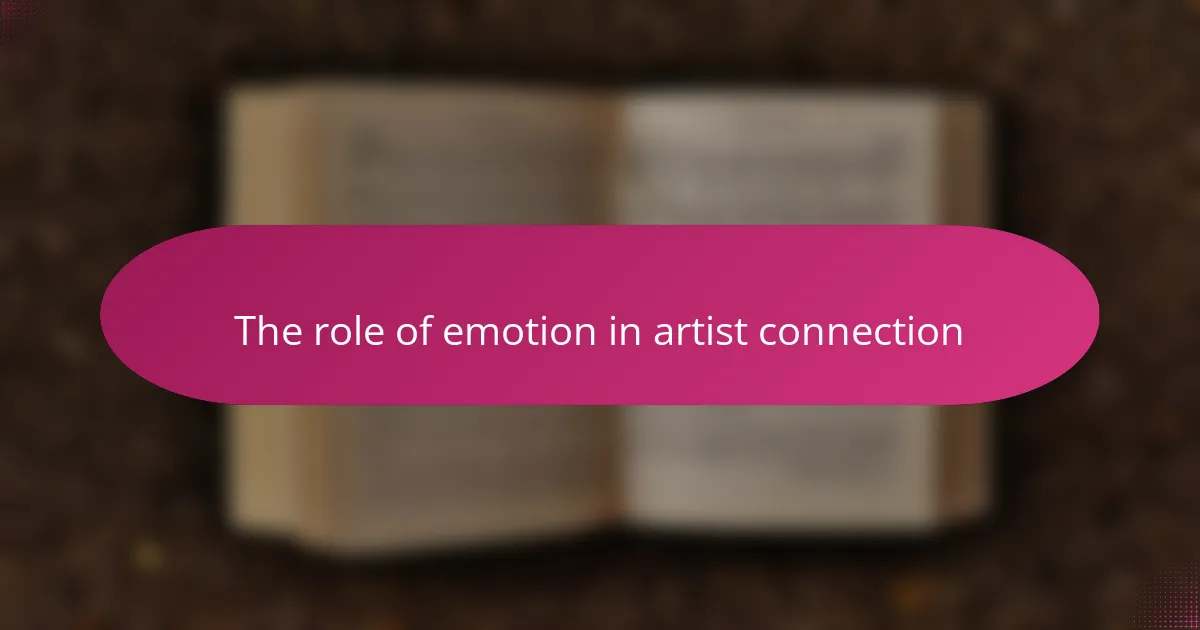
The role of emotion in artist connection
Emotion is the bridge that connects me to an artist beyond just their sound or style. When an artist lets their feelings bleed through their lyrics, I feel like I’m being trusted with something deeply personal. Have you ever listened to a song and felt like the artist was speaking directly to your own heartache or joy?
In rap, where toughness often dominates, emotion creates a powerful contrast that draws me in. It makes the artist more human and their stories more vivid, breaking down walls between performer and listener. I remember the first time I heard a rapper openly express vulnerability—it changed how I saw the whole genre.
Does sharing emotion make artists more relatable? From my experience, absolutely. It’s those moments of emotional honesty that turn music into a conversation—a shared space where we all recognize our struggles and triumphs. That connection is what keeps me coming back, track after track.
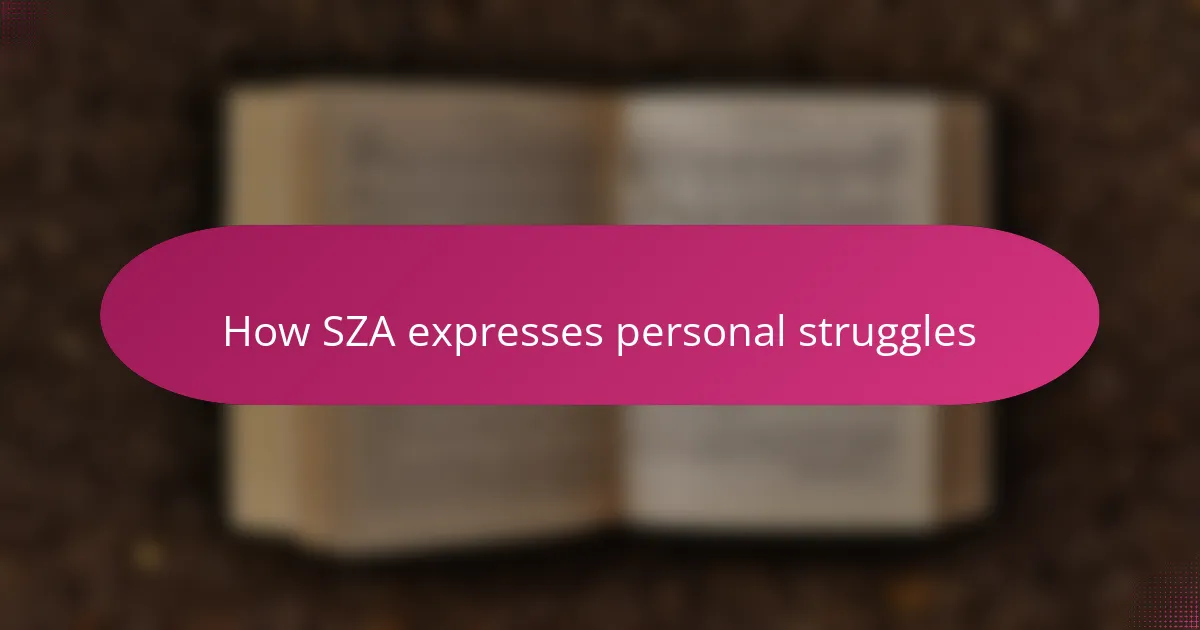
How SZA expresses personal struggles
What impresses me most about SZA is how she doesn’t just hint at her struggles—she lays them bare with a rawness that feels almost fearless. Listening to her, I often catch myself nodding along to lines that peel back layers of doubt, anxiety, and heartbreak in ways I hadn’t expected from a rap-adjacent artist. Have you ever come across a verse that felt like someone was reading your journal out loud? That’s the kind of connection SZA creates through her vulnerability.
Her use of simple but powerful imagery makes her struggles tangible without overwhelming the listener. There’s a moment in one of her songs where she confesses feeling lost and uncertain—a sentiment so universal yet rarely expressed so openly in this genre. From my perspective, this honesty invites listeners into a safe emotional space, where imperfections aren’t hidden but embraced.
I also appreciate how SZA balances exposing pain with moments of self-reflection and hope. It’s not just about suffering; it’s about navigating that suffering and finding strength in the process. When I hear her sing about these personal battles, it reminds me that vulnerability isn’t a setback—it’s part of what makes us resilient. Doesn’t it feel good to hear someone articulate the messy, complicated parts of being human?
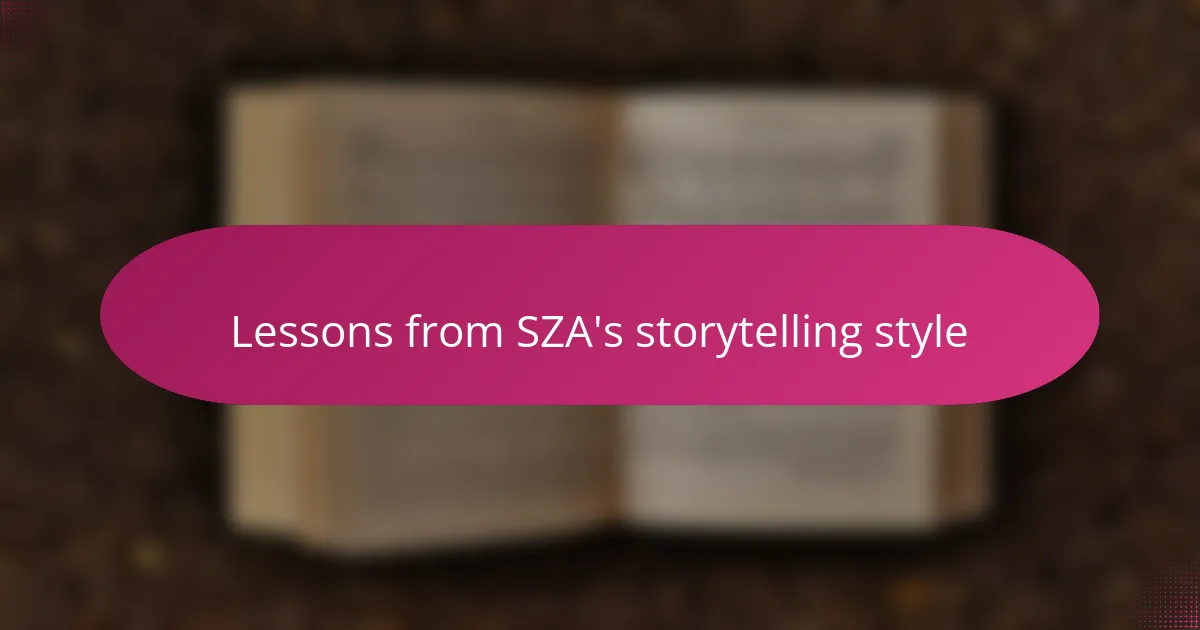
Lessons from SZA’s storytelling style
SZA’s storytelling style taught me that vulnerability doesn’t have to be complicated to be powerful—sometimes, the simplest lines hit the hardest. When I first heard her deliver a plainspoken confession, it felt like a fresh breath in a genre that can get caught up in flashy wordplay. Have you ever noticed how honesty, even when straightforward, can punch through noise and grab your full attention?
What really grabbed me is how she weaves vulnerability into her narratives without making it the whole story. It’s not just pain or heartache; it’s also curiosity, growth, and acceptance. This balance kept me hooked, because it felt like listening to a friend who’s real about their flaws but still hopeful about what’s next.
I remember thinking how rare it is to find that mix of raw emotion and storytelling craft in rap-adjacent music. SZA’s approach made me reconsider what rap storytelling can be, showing me it’s okay to be open, messy, and deeply human all at once. Isn’t that the kind of connection we all crave when we press play?
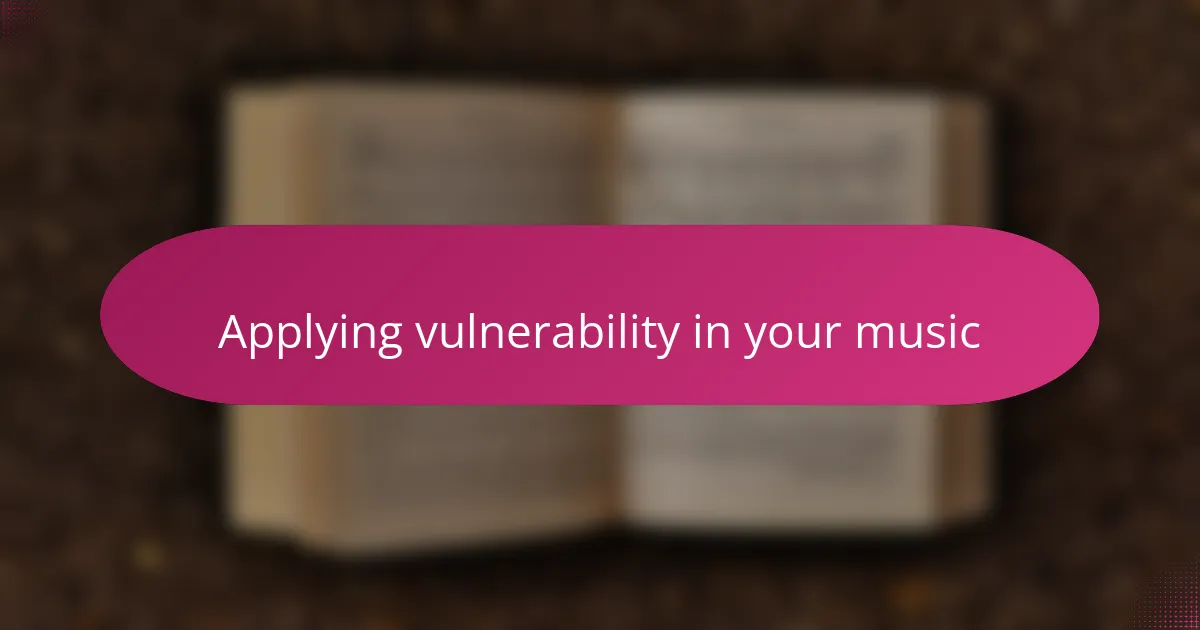
Applying vulnerability in your music
Applying vulnerability in your music starts with a willingness to be honest, even when it feels uncomfortable. I’ve found that when I allow myself to share moments of doubt or fear in my lyrics, it opens up space for listeners to connect on a deeper level. Have you ever felt that raw honesty in a song made the artist feel like a kindred spirit rather than just a performer?
It’s not about oversharing, but about choosing the moments that reveal something real beneath the surface. From my experience, vulnerability becomes powerful when it’s woven naturally into your story — like letting listeners in on your struggles without losing sight of hope or growth. When I write this way, the music feels less like a performance and more like a conversation.
Sometimes, applying vulnerability means embracing imperfection, both in your lyrics and delivery. I remember trying to perfect a track until I realized the cracks and hesitations were what gave it soul. That imperfection invited empathy and made the vulnerability authentic. Isn’t it interesting how showing your flaws can actually make your music stronger?
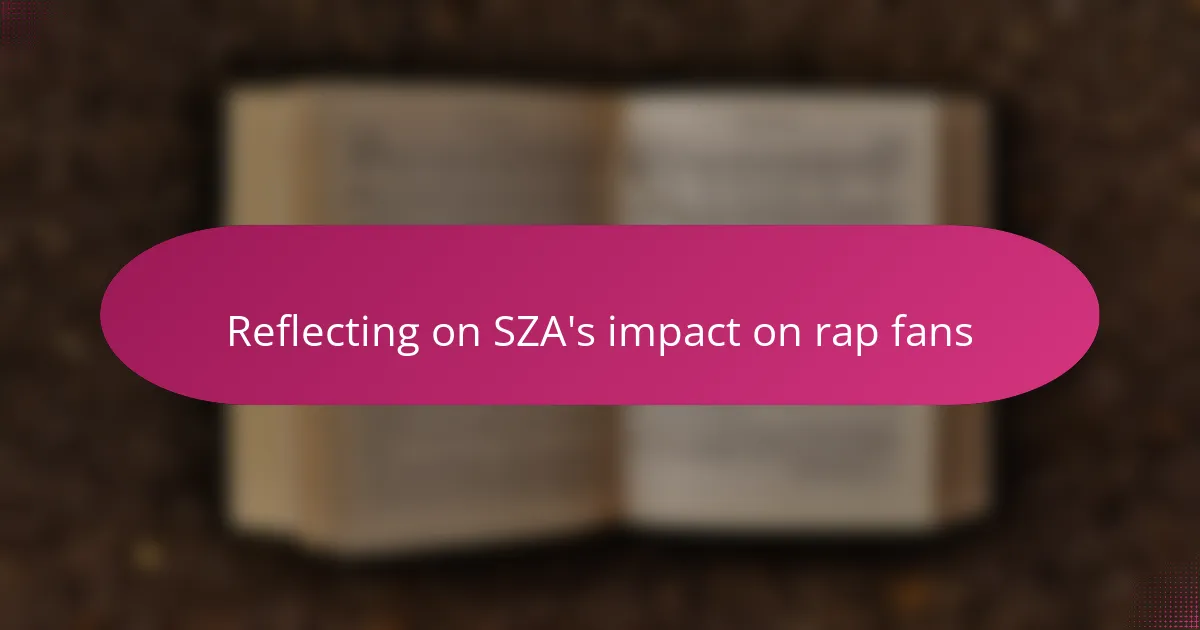
Reflecting on SZA’s impact on rap fans
SZA’s vulnerability has had a noticeable ripple effect on rap fans like me. When I first tuned into her music, it felt like she was breaking down walls that typically keep rap artists distant, offering a rare glimpse into her emotional struggles. Have you ever experienced that moment when an artist’s openness suddenly makes you feel less alone? That’s exactly what happened with SZA’s raw honesty.
What fascinates me is how her willingness to be vulnerable invites fans to embrace their own imperfections without shame. I’ve seen communities of rap listeners come together, sharing stories sparked by her lyrics, proving that her impact goes beyond just the music. It’s like SZA created a safe space within rap—a genre often seen as tough or unyielding—where emotion is not only accepted but celebrated.
From my perspective, this shift matters profoundly. SZA’s influence has encouraged rap fans to appreciate complexity in both artists and themselves. Isn’t it powerful to think that one person’s courage to be vulnerable can change how an entire fan base understands strength? That’s the kind of transformative impact I believe SZA has had on rap culture and its followers.
